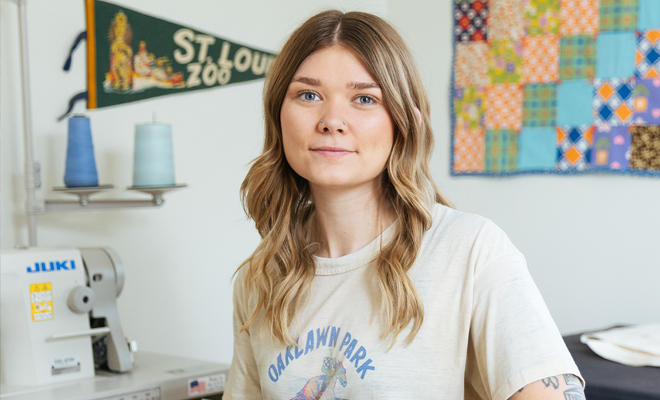 Amber Deery
Amber Deery
Alyx Jacobs: “Slow fashion is my lifestyle!”
Patrick Grant, Scottish fashion designer, businessman and a judge on the reality series The Great British Sewing Bee, has said, “We have enough clothing on the planet right now to clothe the next six generations of the human race; we have to find ways of using what we’ve got.”
Yet, our desire for the latest and greatest look is feeding an industry that is responsible for a shocking 4 to 10 percent of global greenhouse gas emissions every year. We are figuratively drowning in clothing; an astounding 100 billion garments are produced globally every year. Many times they are manufactured under terrible working conditions that employ, for the most part, women, and in many cases, children. Fast fashion, a design, manufacturing and marketing method focused on rapidly producing high volumes of clothing, is negatively impacting our world.
A commitment to sustainable fashion drives many decisions made by Kansas City, Missouri, artist Alyx Jacobs and her small business, Slowly Made. Through many different creative avenues, she finds ways to make the most out of everything she touches, especially clothing.
“Everyone can work towards a more sustainable closet by buying used clothing and committing to purchasing nothing new. Buying used clothes has gotten a bad rap. You don’t have to shop at thrift stores to find used clothes,” shared Alyx. “You can purchase brands that you know and love at stores like Arizona Trading Company, Poshmark, Noihsaf Bazaar, Nuuly, Depop, eBay, local clothing swaps and so much more. I urge everyone to go one month without buying a new piece of clothing and really see how simple it is. If you must buy new, avoid fast fashion stores at all cost. These stores are terrible for the people creating the clothes, terrible for the earth and terrible for the future of fashion.”
The Most Sustainable Option
Sustainable fashion refers to an overarching description for clothes that are created and consumed in a way that can be sustained, while protecting both the environment and the people making the garments. Alyx noted that addressing overproduction, reducing pollution and waste, cutting carbon dioxide emissions and ensuring that garment workers are paid a fair wage with safe working conditions are critical for everyone.
“The clothes you already own are the most sustainable option because you already own them. Throwing away the clothes that you own to transition to a sustainable wardrobe is indeed not very sustainable. It is easy to get wrapped up in this mindset, though,” she stated. “Once you learn the truths about fast fashion, you don’t want to be caught dead in a fast fashion top. But once the item is produced and purchased, the best thing you can do for it is love it, repair it when it tears and swap or donate it when you are done with it.”
Slowly Building a Business
Her solid foundation of embracing sustainable fashion came in 2012 when Alyx got to the Kansas City Art Institute. She chose graphic design as her degree, and “fell hard and fast with that and printmaking.” But good fortune stepped in during her junior year when she took a quilting elective and deeply fell in love with fiber. In 2015, she began experimenting with the indigo dye process, a natural dye made from leaves and used for centuries in Japan and India. Alyx notes that the “final product comes out of the vat as a bright green but changes into the beautiful indigo right in front of your eyes. It’s magical process.” She also took a Remade Sewing class to study mending clothes by using found materials and repairing garments instead of throwing them away when they are damaged.
“I currently run many businesses, all with the same Slowly Made name. When I make quilts, it’s Slowly Made by Alyx Jacobs, but when I send invoices for mending clothes, it’s the Slow Mend. It’s a slow movement,” said Alyx. “I naturally dye fabric for clients, host indigo dyeing workshops, teach mending workshops and repair clothes for customers. People want to repair their clothes. They have beloved garments they don’t want to throw away because they’re vintage or their favorite. I have a studio at my house, and they bring pieces to me and I fix them—jeans, antique linens, really delicate lace, linen and silk. People might be embarrassed to bring me fast fashion but that’s okay. I would rather you bring me the clothes that you love so that I can fix it and you can continue to wear it until the end of its life. This is the work that takes up most of my time. I’ve never turned away a piece of clothing because it was ‘too far gone.’ I repair all types of clothes, add buttons, repair crotch blowouts and tailor pants.”
Alyx is also keen to pass on her knowledge of taking care of clothing. The fourth Tuesday of every month from 6:00 to 8:00 p.m. she hosts a mending workshop alongside knitwear designer Carina Spencer, at Yarn Social, 1707 West 45th Street, Kansas City, Missouri. At different times throughout the summer, she offers indigo workshops in her backyard. She recommends checking her Instagram or visiting her website to ensure dates and times.
How To Embrace Sustainable Fashion
It’s clear that sustainable fashion is at the core of Alyx’s business. But breaking the “want” for the latest clothing, she readily admits, was a difficult process for her. When she changed her mindset to one of sustainable fashion, it did become easier. She recalls that for the first year, she stopped walking by the clothing departments of many fast fashion stores or retailers because they are designed to make you want to purchase even though you don’t need them. However, they’re cheap, trendy and probably constructed in a questionable manner. She shares that once you break this cycle and train yourself that you are only allowed to buy your clothes used, it will become much easier. You will also have a much more interesting wardrobe.
“A huge part of the circular clothing economy is loving your clothes. This is a different kind of love than ‘OMG, I love shopping!’ and buying 15 pieces that you’ll wear once and let rot in the back of your closet,” she commented. “It’s really truly loving your curated closet and treating your clothing as if they aren’t disposable. This means washing them on cold, hanging to dry, or drying on low, low, low heat (the dryer is your clothes’ worst enemy), repairing when they rip, overdyeing when there is a stain that can’t be removed and, at the very end of their life, either donating or taking to a clothing swap.”
Alyx has an extensive business career as an art director in the private sector, but she’s also focused on building her Slowly Made commerce. However, she believes that fashioning a company does not create a division between her work and her life. “I don’t consider this a full-time job; it’s a lifestyle for me. Obviously, it’s a business, a side hustle. But I don’t think of it as a business because it’s so intertwined with my life. As an artist, I’m giving this clothing a new life through sewing and patches; it fills all of these spaces in my life. It is my art, business and a relaxing thing that I do,” advised Alyx. “I really try to wholeheartedly be myself and be genuine in my work. One example is that I do not have a separate Instagram for my business and my life. Many choose to do that, but I’m in the mindset that if you like my work and want to experience and view these beautiful things I’m making, then you’ll also want to see my weird, hairless cats, the time that I spend with my mom and dad and the sailboat that I own with my boyfriend. I don’t want a separation between who I am as a person and my business.”
Searching for Sustainable
If you’re looking for a different dress for an event, Alyx recommends typing into your search engine, for example: “sustainable” little black dress, and it will gear your quest to more sustainable brands and even those that rent garments. Some outliers may pop into your results so it’s important that you study them to ensure you’re looking at sustainable websites. She also advises that you can greatly narrow your search, for example, to used hiking gear or one-piece swimsuits. It’s not difficult to find these items and purchase from reputable businesses.
“Avoid fast fashion at all costs. Truly love your clothes and do not treat them as if they are disposable. Repair them when they tear and curate your closet,” she remarked. “You do not need seven leather jackets that are close to what you want because they were on sale; you need one leather jacket that fits you perfectly.”
Alyx suggests thegoodtrade.com if you want to learn more about fast fashion and sustainable fashion, and view her creations at alyxjacobs.com.









